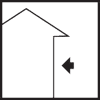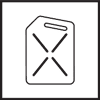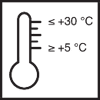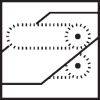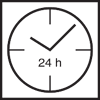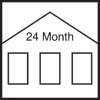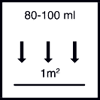Article No. 261020
Solvent-based translucent primer with film preserver

Product specifications
The stated values represent typical product characteristics and are not to be construed as binding product specifications.
Field of application
- For use on exterior wood
- Soft and hard woods
- Dimensionally stable wood building elements: e.g. windows and doors (including their interior surfaces)
- Wood building elements with limited dimensional stability, e.g. folding shutters, matchboarding, summerhouses
- Wood building elements with no dimensional stability: e.g. fences, framework, carports, planking
- Can also be used as a thin-layer varnish for building elements that are not dimensionally stable
Properties
- Good pore wetting performance
- Ready to apply by dipping or flow-coating
- Good flow characteristics on untreated and impregnated wood
- Film preserver protects against microbial damage
- Weather resistant
- Long open working time
-
Preparation
-
Substrate requirements
The substrate must be clean, dry, free of dust, grease and loose substances, and prepared in the correct manner.
Dimensionally stable wood building elements: wood moisture content 11-15%
Wood building elements with limited or no dimensional stability: wood moisture content max. 18%
-
Preparations
Completely remove old coatings (e.g. paints or medium-build stains), bark, bast and dirt.
Remove loose and torn knots as well as resin that bleeds and clean with a suitable product (e.g. Remmers thinner & brush cleaner).
Smooth, planed wood surfaces should be sanded and dusted before the coating is applied to ensure better absorption.
If necessary, impregnate non-resistant woods with a wood preservative* (*Use biocides safely. Always read the label and product information before use).
Observe BFS Code of Practice No. 18 "Coatings on Wood and Wooden Working Materials in Outdoor Areas".
-
-
Application
-
Application requirements
Temperature of the material, air and substrate: from min. +5 °C to max. +30 °C
-
Stir well, including during application or after a break in work.
Qualified specialist companies: brushing, dipping, flow-coating and spraying in closed systems only.
Seal opened containers well and use contents as soon as possible.
-
Application instructions
-
Check colour, adhesion and compatibility with the substrate by setting up a trial area.
Ensure good aeration and ventilation in particular in series production.
Sealing compounds must be compatible with the coating and may only be applied once the coating has dried thoroughly.
Clear, white and hemlock are suitable for use only on not directly weathered surfaces in outdoor areas, such as roof eaves, or as base coat.
Rainfall may cause water soluble substances to bleed from wood that is rich in such substances, e.g. oak, red cedar, afzelia, redwood, etc. This may lead to the discolouration of light-coloured masonry or render.
Cut end-grain surfaces at the bottom to create a water-drip edge.
Seal end-grain surfaces using LT Stain UV in the corresponding colour (at least 2 coats).
Each layer of stain results in a more intense colour and a glossier finish.
-
Drying
Can be overcoated: after approx. 24 hours
Practice values at +20 °C and 65% relative humidity.
Low temperatures, poor ventilation and high humidity delay drying.
-
Thinning
Ready to use
-
Working tools / cleaning
-
Brush, dipping tank, flow coating facility, spray coating facility, board coating machine
-
Clean tools immediately after use with V 101 Thinner.
Dispose of the remains from cleaning properly.
-
Storage / shelf life
-
If stored unopened in its original container in a cool, dry place and protected against frost, the product will keep for at least 24 months.
-
Usage
-
80 - 100ml/m² per coat
-
Depending on the processing method, wood type and wood surface.
-
General information
-
Do not use on wood intended to come into direct contact with food or feed.
-
-
Disposal instructions
-
Larger quantities of leftover product should be disposed of in the original containers in accordance with the applicable regulations. Completely empty, clean containers should be recycled. Do not dispose of together with household waste. Do not allow to enter the sewage system. Do not empty into drains.
-
-
Safety / regulations
-
For further information on the safety aspects of transporting, storing and handling the product and on disposal and environmental matters, please see the current Safety Data Sheet.
-

